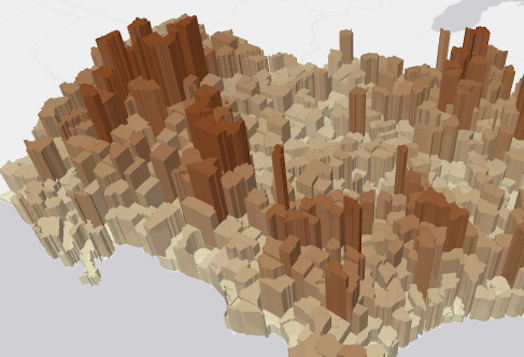ExtrudeSymbol3DLayer
require(["esri/symbols/ExtrudeSymbol3DLayer"], function(ExtrudeSymbol3DLayer) { /* code goes here */ });esri/symbols/ExtrudeSymbol3DLayerExtrudeSymbol3DLayer is used to render Polygon geometries by extruding them upward from the ground, creating a 3D volumetric object. This is done with a PolygonSymbol3D in a SceneView. MapView does not support 3D symbols.
The color of the symbol is set in the material property. The height of the extrusion is always defined in meters with the size property. Extrusion height and color can also be data-driven by adding size and/or color visual variables to any Renderer that uses this symbol layer.
An ExtrudeSymbol3DLayer must be added to the symbolLayers property of a PolygonSymbol3D. Multiple symbol layers may be used in a single symbol. The image below depicts a polygon FeatureLayer representing building footprints. The features are symbolized with a PolygonSymbol3D containing an ExtrudeSymbol3DLayer. The extrusion is based on the height of buildings.
See Symbol3DLayer and Symbol3D to read more general information about 3D symbols, symbol layers and how they relate to one another.
Autocasting support
As of version 4.5 of the ArcGIS API for JavaScript, autocasting is universally supported for all renderers, symbols, and symbol layers in the API. So there is no need to include this module in the require() and define() module loaders of your application unless you intend to use the static method(s) of this module.
- See also:
var symbol = {
type: "polygon-3d", // autocasts as new PolygonSymbol3D()
symbolLayers: [{
type: "extrude", // autocasts as new ExtrudeSymbol3DLayer()
size: 100000, // 100,000 meters in height
material: { color: "red" }
}]
};Constructors
- new ExtrudeSymbol3DLayer(properties)
- Parameter:properties Objectoptional
See the properties for a list of all the properties that may be passed into the constructor.
Property Overview
| Name | Type | Summary | Class | |
|---|---|---|---|---|
| String | The name of the class. more details | more details | Accessor | |
| Edges3D | Sets the contour edges on polygons symbolized with ExtrudeSymbol3DLayer. more details | more details | ExtrudeSymbol3DLayer | |
| Object | The material used to shade the extrusion. more details | more details | ExtrudeSymbol3DLayer | |
| Number | The height of the extrusion in meters. more details | more details | ExtrudeSymbol3DLayer | |
| String | For ExtrudeSymbol3DLayer the type is always | more details | ExtrudeSymbol3DLayer |
Property Details
- Since: ArcGIS API for JavaScript 4.7
The name of the class. The declared class name is formatted as
esri.folder.className.
- Since: ArcGIS API for JavaScript 4.7
Sets the contour edges on polygons symbolized with ExtrudeSymbol3DLayer.
Example:var symbol = { type: "polygon-3d", // autocasts as new PolygonSymbol3D() symbolLayers: [{ type: "extrude", // autocasts as new ExtrudeSymbol3DLayer() material: { color: [244, 247, 134] }, edges: { type: "solid", // autocasts as new SolidEdges3D() color: [50, 50, 50, 0.5] } }] };
The material used to shade the extrusion. This property defines the extrusion's color.
- Property:
- optionalcolor ColorDefault Value:white
The fill color of the extrusion. This can be autocast with a named string, hex string, array of rgb or rgba values, an object with
r,g,b, andaproperties, or a Color object.
Examples:// CSS color string symbolLayer.material = { color: "dodgerblue" };// HEX string symbolLayer.material = { color: "#33cc33"; }// array of RGBA values symbolLayer.material = { color: [51, 204, 51, 0.3]; }// object with rgba properties symbolLayer.material = { color: { r: 51, g: 51, b: 204, a: 0.7 } };
- sizeNumber
The height of the extrusion in meters. Negative values will extrude the polygon surface downward towards or below the ground.
- Default Value:1
Examples:// polygon is extruded 50,000 meters symbolLayer.size = 50000;// polygon is extruded 50,000 meters below the ground symbolLayer.size = -50000;
- typeStringreadonly
For ExtrudeSymbol3DLayer the type is always
extrude.
Method Overview
| Name | Return Type | Summary | Class | |
|---|---|---|---|---|
| ExtrudeSymbol3DLayer | Creates a deep clone of the symbol layer. more details | more details | ExtrudeSymbol3DLayer | |
| * | Creates a new instance of this class and initializes it with values from a JSON object generated from a product in the ArcGIS platform. more details | more details | Symbol3DLayer | |
| Object | Converts an instance of this class to its ArcGIS portal JSON representation. more details | more details | Symbol3DLayer |
Method Details
- clone(){ExtrudeSymbol3DLayer}
Creates a deep clone of the symbol layer.
Returns:Type Description ExtrudeSymbol3DLayer A deep clone of the object that invoked this method. Example:// Creates a deep clone of the graphic's first symbol layer var symLyr = graphic.symbol.symbolLayers.getItemAt(0).clone();
- fromJSON(json){*}static
Creates a new instance of this class and initializes it with values from a JSON object generated from a product in the ArcGIS platform. The object passed into the input
jsonparameter often comes from a response to a query operation in the REST API or a toJSON() method from another ArcGIS product. See the Using fromJSON() topic in the Guide for details and examples of when and how to use this function.Parameter:json ObjectA JSON representation of the instance in the ArcGIS format. See the ArcGIS REST API documentation for examples of the structure of various input JSON objects.
Returns:Type Description * Returns a new instance of this class.
Converts an instance of this class to its ArcGIS portal JSON representation. See the Using fromJSON() topic in the Guide for more information.
Returns:Type Description Object The ArcGIS portal JSON representation of an instance of this class.
